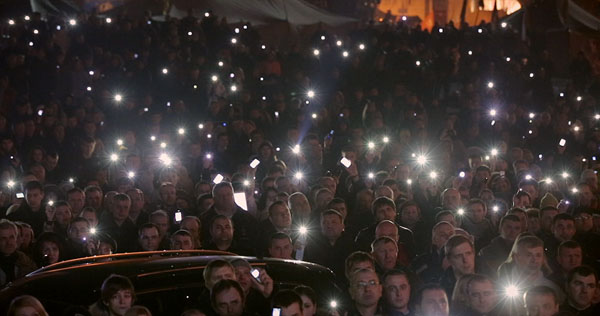Cinema Guild has announced that it’s acquired Sergei Loznitsa‘s new documentary, Maidan, which premiered as a Special Screening last month in Cannes. Indiewire‘s Brandon Latham notes that there’ll be “a full theatrical release later this year, which will be followed by home and VOD releases.”
Introducing his interview with Loznitsa for the Daily Beast, Richard Porton notes that Maidan “chronicles the resistance to the corrupt regime of Ukraine’s former president, Victor Yanukovych. Employing an observational style that encourages spectators to relive the events of the Ukrainian Revolution, the film charts the protests’ trajectory from the initial exhilaration of the occupation of Kiev’s Maidan Nezalezhnosti, a.k.a. Independence Square, to the brutal repression of demonstrators that ended with the deaths of an estimated 77 people in February 2014.”
“The sense of participating in epochal history-making events is there from the start,” writes the Guardian‘s Andrew Pulver. “However, this is not your standard historical-sweep account: no talking heads, no voiceover, only the barest scraps of information on title cards. Nor does Loznitsa focus, in the conventional way, on individual protagonists to guide us through the chaos. This is a film about the chaos: the mass of undifferentiated people milling about the square, the occasional purposefulness as food and equipment are ferried about, the random songs and poems, the stream of (largely offscreen) speeches and exhortations from the stage in the middle of it all.”
At the moment, it seems that the only available trailer has French subtitles, but you’ll get a sense of Maidan here nonetheless
“Loznitsa and his colleagues stand steadfast in every sense, the cameras fixed throughout except for a couple of occasions, for instance when the police aim their attack at the journalists’ enclosure,” writes Leslie Felperin in the Hollywood Reporter. “Balancing this thick-of-it immediacy, there are also some stunningly composed high long-distance shots, presumably captured from the tower blocks surrounding the square, that suggest 18th-century battlefield paintings, showing tiny troops dwarfed in a panoramic landscape, the composition adorned by fireworks or a serene moon hanging pendant above. But these moments of beauty never trivialize the bloodshed and tragedy of the events recorded here; instead they enhance the poignancy of the film, creating both a literal and metaphoric sense of distance that underscores that this was history in the making. If the communards in Paris in 1871 had owned top-grade digital cameras, they would have made a movie much like Maidan.”
Variety‘s Jay Weissberg calls Maidan “one of the few documentaries about recent revolutions that won’t feel dated in five years,” and at Indiewire, Nikola Grozdanovic calls it “the most humanitarian film to come out of Cannes this year.”
Update, 10/27: “What I found most striking about the film was the role played by aesthetics in the spectacle of revolution,” writes Girish Shambu. “Protesters chant and sing rousing revolutionary songs, often with inventive up-to-the-minute lyrics (the singers are almost never seen onscreen; the source of the singing is usually outside the frame); music, frequently percussive and rhythmic, surges up from the crowd; and what appear to be ordinary people—i.e. non-artists—come on stage to recite poems at the microphone. In an awe-inspiring moment, a riot rages on the ground while fireworks explode in the sky. The film miraculously catches this festive, celebratory quality of revolution, even in the midst of violence and death.”
Update, 11/3: Nicolas Rapold interviews Loznitsa for Film Comment: “My personal opinion is one should live one’s life in such a way that he should be prepared to die every single day. Morally prepared, so to speak.”
For news and tips throughout the day every day, follow @KeyframeDaily. Get Keyframe Daily in your inbox by signing in at fandor.com/daily.




